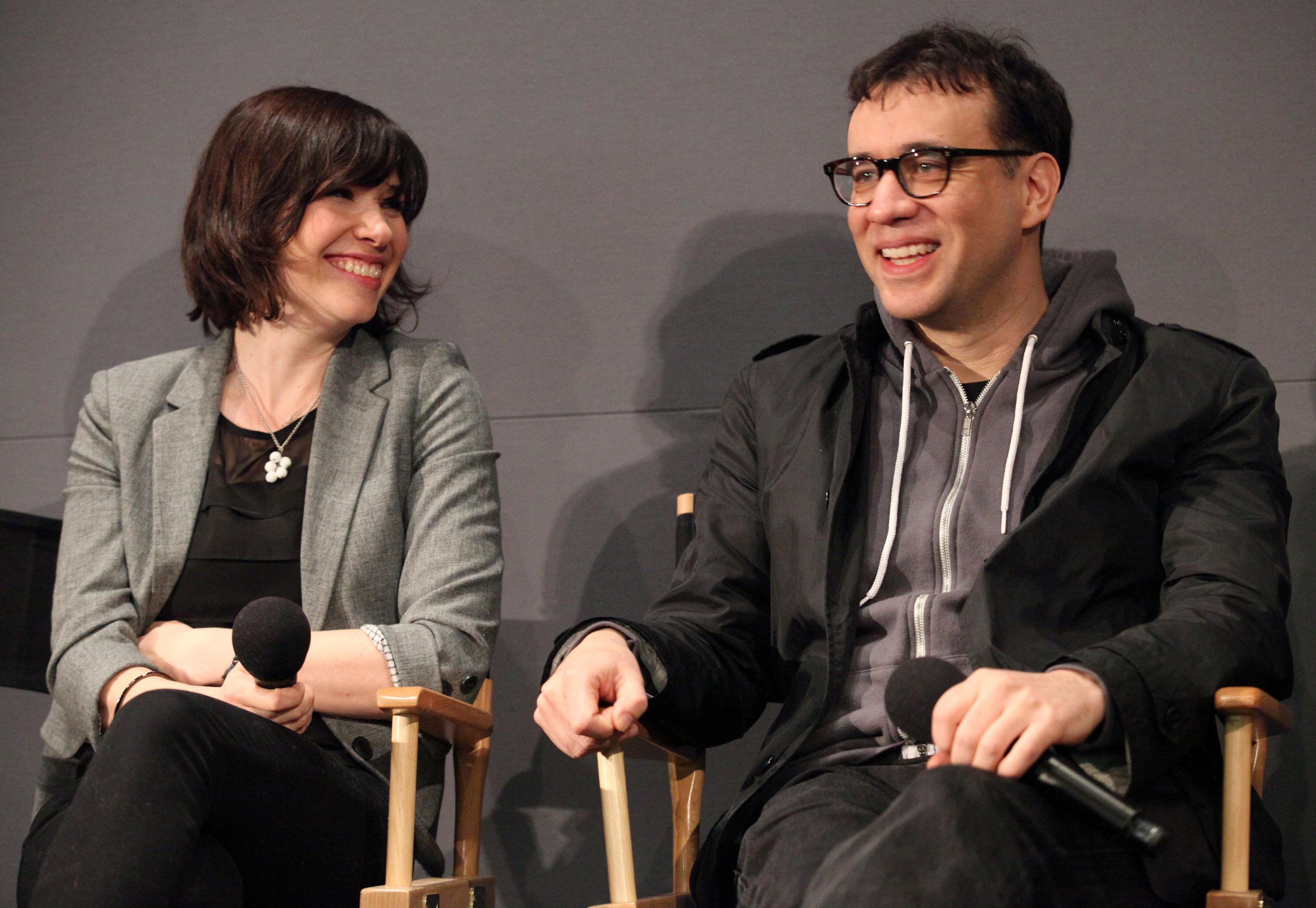Until this week, when I sat down and mainlined Season 1 of Portlandia (more or less the same way a couple inhales every episode of Battlestar Galactica in an episode from Season 2), I’d mostly experienced the show on a molecular, sketch level. Acquaintances would tweet links or share videos on Facebook, and thus I would discover the queasy competitiveness of “Did You Read?” or the crafty genius of “Put a Bird on It.”
Almost everything I saw was familiar, funny, and charming. Typically, Fred Armisen and Carrie Brownstein begin each sketch with a recognizable situation—one that will be especially familiar if, like me, you spent decades in collective workplaces and group houses and know more vegans than investment bankers. They then take it to a surreal extreme that somehow points out the ridiculousness of it all. In her wonderful New Yorker piece last week, Margaret Talbot described some typical Portlandia characters: “bicycle-rights activists, dumpster divers, campaigners against any theoretical attempt to bring the Olympics to Portland, animal lovers so out of touch that they free a pet dog tied up outside a restaurant.”
It’s a festival of smugness, in other words: There doesn’t seem to be anything more important at stake than recognizing the exact moment when it’s hip to sport a certain configuration of novelty facial hair, ride a fixed-gear bicycle, or participate in an adult hide-and-go-seek league. The characters’ essential goodness is assured, but they do spend an awful lot of time preening and congratulating themselves on their own coolness. The preciousness is sick-making. On the other hand, if Portland’s biggest claim to dickishness is that its residents care too much about animals, bikes, and craft projects, it’s a place I’d be interested in moving to.
In fact, I spent 15 years in a similar city: Seattle. When I moved there in 1990, Seattle was enjoying a moment—everything from its coffee culture to its computer software and especially its music scene were suddenly the apex of cool. This was tricky for longtime Seattlites, who seemed simultaneously proud of and embarrassed by all the attention. The Seattle Times ran a regular column that rounded up every mention of the city in the national and international press, the way a proud mom might put together a scrapbook of her offspring’s science-fair achievements. (That booster columnist, Jean Godden, is now a member of the Seattle City Council.) At the same time, there was something like a conspiracy to keep quiet about the city’s awesomeness—and to exaggerate its flaws, such as the weather. (Yes, it’s often gray and overcast in Seattle, but there’s more annual rainfall in places like Atlanta, New York, and Washington, D.C.)
There’s a quiet rivalry between the two Pacific Northwest cities that’s reflected in the show. On one occasion when Carrie and Fred go to visit Portland’s mayor—played in the show by Kyle MacLachlan (the city’s real-life mayor, Sam Adams, plays his assistant, Kyle)—he shows off a certificate for “Best Official Website for cities with populations under 700,000 in the Pacific Northwest area.” He had it made up and presented it to himself, he admits, but he insists it’s well-deserved. Then he adds, “Seattle’s is the worst. Too many links.” (MacLachlan, of course, is famous partly for playing Special Agent Dale Cooper on Twin Peaks—which was set in a fictional Washington state town. More pointedly, Season 2 of Portlandia features a cameo from Eddie Vedder, famous frontman of Seattle’s own Pearl Jam; this prompted some predictable Seattlite handwringing.)
There are some people, Portlanders mostly, who claim the city to the south has now supplanted Seattle as the bastion of Pacific Northwest cool. They cite Stumptown Coffee, with its ridiculously precious tasting notes (Panama Duncan Estate: “A rose fragrance debuts flavors of pear, coconut and marshmallow with caramel throughout the cup”) gaining ascendance over Seattle’s java scene, but that only works if your idea of Seattle joe is corporate behemoth Starbucks rather than, say, Vivace or any of the other indie sources. Portland has a “beer scene,” they bleat. Who cares? Seattle is now all about craft distilleries.
Like bigger, stronger, cooler siblings everywhere, Seattle doesn’t worry too much about Portland. It’s just a place to go to when you want to buy something without paying sales tax. According to a November story in the Oregonian, when Armisen and Brownstein announced “Portlandia: The Tour,” all the tickets for the Portland gig were snapped up within minutes. “As of this writing,” the story continued, “all the other stops on the tour are also sold out—except for Seattle.”
